牛津英语8B Unit 1 知识点默写教学案02
译林牛津八年级下册 8B知识点梳理.doc
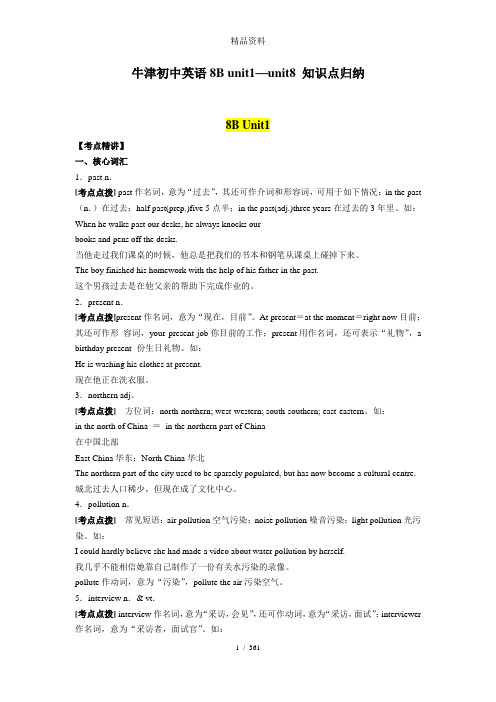
牛津初中英语8B unit1—unit8 知识点归纳8B Unit1【考点精讲】一、核心词汇1.past n.[考点点拨] past作名词,意为“过去”,其还可作介词和形容词,可用于如下情况:in the past (n.)在过去;half past(prep.)five 5点半;in the past(adj.)three years在过去的3年里。
如:When he walks past our desks, he always knocks ourbooks and pens off the desks.当他走过我们课桌的时候,他总是把我们的书本和钢笔从课桌上碰掉下来。
The boy finished his homework with the help of his father in the past.这个男孩过去是在他父亲的帮助下完成作业的。
2.present n.[考点点拨]present作名词,意为“现在,目前”。
At present=at the moment=right now目前;其还可作形容词,your present job你目前的工作;present用作名词,还可表示“礼物”,a birthday present -份生日礼物。
如:He is washing his clothes at present.现在他正在洗衣服。
3.northern adj。
[考点点拨] 方位词:north-northern; west-western; south-southern; east-eastern。
如:in the north of China =in the northern part of China在中国北部East China华东;North China华北The northern part of the city used to be sparsely populated, but has now become a cultural centre. 城北过去人口稀少,但现在成了文化中心。
牛津译林版英语8BUnit1 Past and present study教案
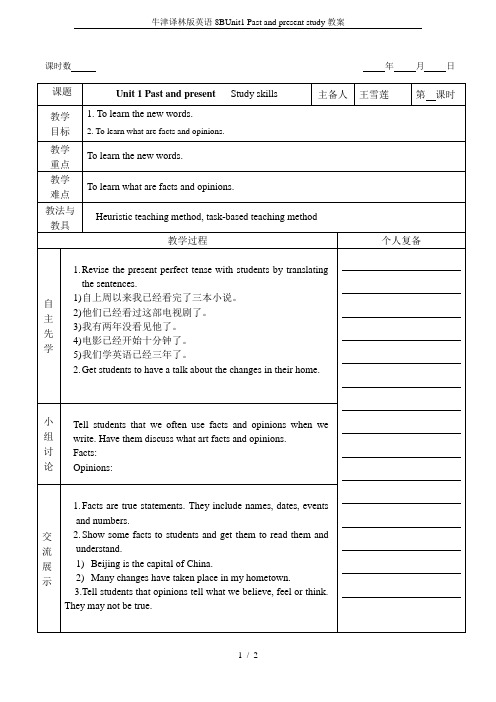
Get students to read the sentences in Part B and decide which
are opinions and facts. And reorganize them into a short passage.
小 Students summarize what are facts and opinions. Lead them to 结 discuss about the usages of it. Think about how it is used in their 反 reading and writing.
思
板 书
教后札记
2/3
牛津译林版英语 8BUnit1 Past and present study 教案 3/3
拓
4) Many of my friends have moved away.
展
5) Life is getting better in some ways.
2. Show more examples to students and get them to read them
and understand.
the se本小说。
主 2)他们已经看过这部电视剧了。
先 学
3) 我有两年没看见他了。 4) 电影已经开始十分钟了。 5) 我们学英语已经三年了。
2. Get students to have a talk about the changes in their home.
and numbers.
交 2. Show some facts to students and get them to read them and
牛津英语8BUnit1全套教案
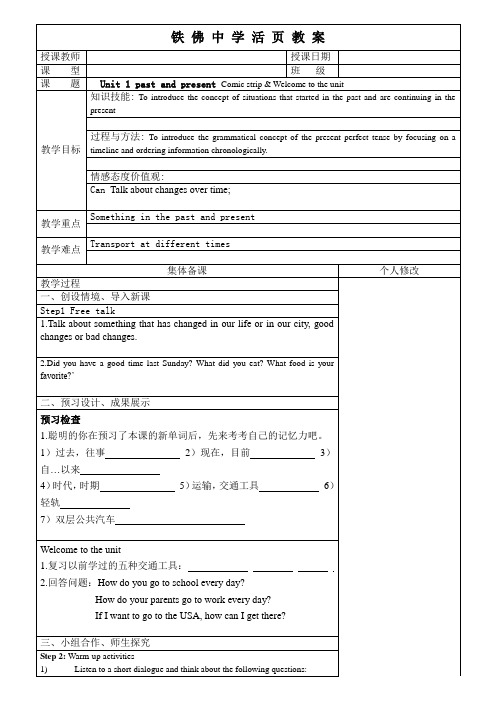
二、预习设计、成果展示
预习检查
1.聪明的你在预习了本课的新单词后,先来考考自己的记忆力吧。
1)过去,往事2)现在,目前3)自…以来
Make sentences according to the time table Eg: The peak tram has been in service since 1890/for 25 years.People began to use the peak tram in 1890
四、归纳总结、巩固提高
4)Change some sentence patterns according to the dialogueEg: I’ve eaten it ------ I haven’t eaten it .----- Have you eaten it? Yes,I have /No,I haven’t.
过程与方法:To introduce the grammatical concept of the present perfect tense by focusing on a timeline and ordering information chronologically.
情感态度价值观:
CanTalk about changes over time;
铁 佛 中 学 活 页 教 案
授课教师
授课日期
课 型
班 级
课Hale Waihona Puke 题Unit 1 past and presentreading(1)
牛津初中英语8B-Unit 1教案1~3

Teaching plan for Unit 1 Past and Present (8B)Period 1 Comic strip and W elcome to the unitAims: 1 To introduce the present perfect tense generally.2 To introduce the different forms of transport at different times in Hong Kong.Important points: Aim 1 and 2Difficult point: Understanding aim 1Methods: Speaking and ReadingNew words: past, present, light rail, peak tram, ferry, tram, since.Procedures:Step 1: Free talkIn the past, Hobo and Eddie were good friends. But now something happens between them. Do you want to know what’s wrong with them?Step 2: Now, read the dialogue, and find out the answers of the following questions.1) What was in the bowl an hour ago?2) What did Eddie do?3) Why did he do that thing?4) Why does Hobo think Eddie has changed?Explaining the new tense : the present perfect tenseEg: Have you seen my food? (see—saw—seen)I’ve (I have) eaten it. (eat—ate—eaten)We ha ve not seen him for a long time ……How has he changed?Let Ss read the dialogue in pairs.Step 3: Everything changes every day, can you find them around you? Give Ss 5 minutes to talk about this topic. Next, you will learn some information about the different forms of transport at different times in Hong Kong. Do you want to know them? Show the pictures . Discuss them with the Ss.: What’s the use of it?Where do you usually see it?Is it a special one? Why?Which transport do you like best?Step 4: They are all good transport. And they are important for us. Now, write the correct names under the pictures.Step 5: Finish part B (Back to the past) &Complete the timeline.Homework: Do the daily paper.8B - Unit 1 Period 2 Reading (1)Aims: 1.To know types of questions used in interviews.2.To guess general meaning from title and context.3.To identify true or false statements based on the reading passage.Important points: Aims 1,2&3.Difficult points: Sentences of present perfect tense.Methods: Speaking &WritingProcedures:Step1: Dictation.Let Ss dictate the names of transports.Step2:Free talkT: Y ou know, I am a teacher now. But five years ago, I was a teacher, too. So I have worked here for 3 years. I think our school changed a lot..Do you think so?S1: Y es, I do.T: What are the changes? Can you give us some examples?S1: The TV is….,The wall is…,Our School life is…,T: So, Everything has changed a lot?Step3: Presentation.1).T: Did you hear of Sunshine Town? Now, look at some pictures of it. find some Ss to say Sth about it.2). T: Would you like to listen to Mr Chen, Daniel’s grandpa?Play the tape for Ss 2 times.3). T may ask Ss some questions:a. How long has Mr Chen known Sunshine Town?b. Did Mr Chen live there all the time? Why?c. Does Mr Chen think the place changed a lot?d. What are the differences between the past and present?4). Check the answers if they can not answer. Explain some difficult points.5). Ask Ss to read in pairs and try to act it out.Step4: Practice.1. Finish off the exercises of partC on P6.(T/F).Correct the sentences.2. Do the daily exercises.Step5:Homework.a.Finish off the exercises.(WB)b. Read the conversation and act it out freely.8B - Unit 1 Period 3 Reading (2)Aims & demands: 1. Recognize types of questions used in interviews2. Master the phrases: in fact/get married/another flat /move out of…/market stalls/play chess/play cards /in some ways/feel a bit lonely/from time to time3. Master the sentences: a. I have known the place for many years. b. I have known it since I was very young. c. It’s nice to do….Key points: 1. have +done 结构 2. Aims2Tools: Pictures & recorderMethods: Explaining & practicingProcedures:Step1. Revision1. Have a dictation.2. Ask some questions:a. Who is Mr Chen?b. What do you know about Mr Chen?c. What was in Sunshine Town in the past?d. How many people lived there?e. What is Sunshine Town now?f. What does Mr Chen do in the new park?g. Why is it much cleaner now?3. Let Ss talk about the changes to Sunshine Town.4. Finish Part D and check the answers.Step2. Explaining1. Present perfect tense: have/has + done现在完成时表示:1)动作发生在过去,对现在有影响或与现在有联系;2)动作发生在过去,并延续到现在。
牛津8B英文Unit 1 Past and present教案
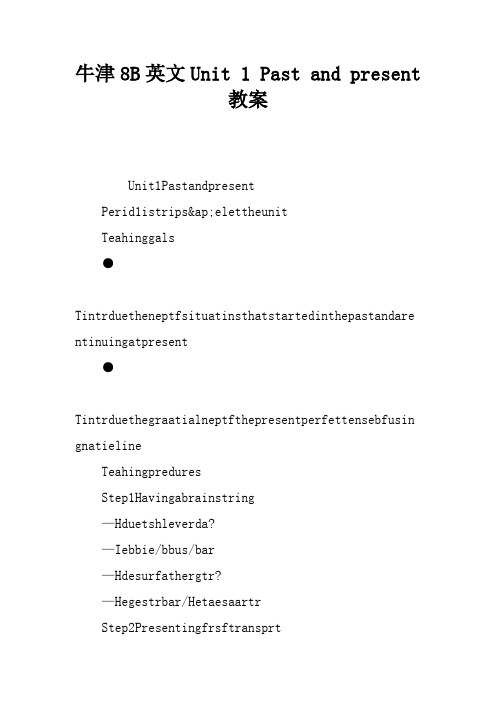
牛津8B英文Unit 1 Past and present教案Unit1PastandpresentPerid1istrips≈elettheunitTeahinggals●Tintrduetheneptfsituatinsthatstartedinthepastandare ntinuingatpresent●Tintrduethegraatialneptfthepresentperfettensebfusin gnatielineTeahingpreduresStep1Havingabrainstring—Hduetshleverda?—Iebbie/bbus/bar—Hdesurfathergtr?—Hegestrbar/HetaesaartrStep2PresentingfrsftransprtThere’stuhtraffiinNaningButpeplebeganttaetheundergrundinX XTheundergrundhasbeeninusesineXXIt’sfastandnvenient N,let’slearnsethingabuttransprtatdifferentties hataretheirnaes?IanttdraatielinefrthedifferentfrsftransprtinBeiingU setheinfratinfrPartAtpletethetieline90091092093094090960970980990XXlightrailtaxibusah/planeundergrundduble-deertrainStep3HavingadisussinDisussthetransprtatdifferenttiesThebushasbeeninusesine198Peplehavetaenthebussine198…Step4ListeningtandreadingadialgueInthepast,pepletthebustrButatpresent,reandrepeplean taethetaxi/undergrund/duble-deerar/trThetransprthas hangedalthatabuturldfriendsEddieandHb?Havethehanged alt?Let’sgntlistentandreadthedialguenpage6beteenEddieandHbT henanserthefllingquestins:here’sHb’sfd?Isitinthebln?hnt?2hhasEddieeatenhisfd?3hatdidHbthinfEddieinthepast?4hatdeshethinfEddien?hdesEddiesathatHbhashangedalt,t?StepListeningandreadingaludListentthetape,andtrtreadaludthedialguenpage6ttheta peStep6Findingandritingexpressinsuaretgverpage6and7againtfindutandritednalltheuseful expressinsaesentenesfurniththeafterlassStep7AtingutthedialgueInpairsatutthedialgueStep8DingheraReadtheistripsandtrtreiteitbTrtrevisethephraseandsentenesinthisperidDtranslatin:我的玩具飞机在哪儿?2你的妈妈怎样去上班?乘坐地铁。
8B牛津英语Unit1复习教案:强化听力理解能力,迎接考试挑战
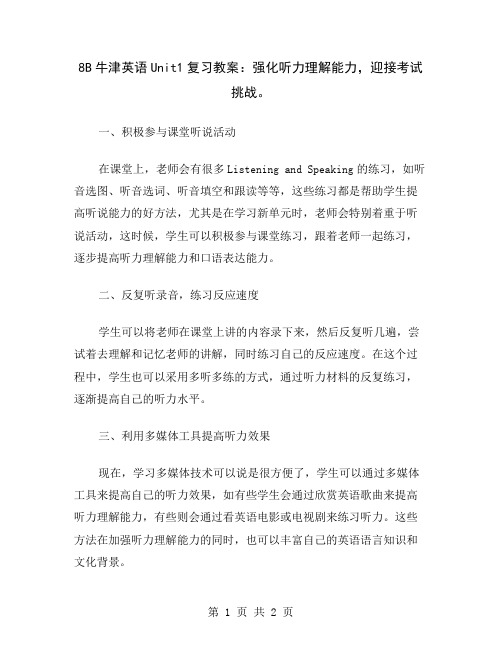
8B牛津英语Unit1复习教案:强化听力理解能力,迎接考试挑战。
一、积极参与课堂听说活动在课堂上,老师会有很多Listening and Speaking的练习,如听音选图、听音选词、听音填空和跟读等等,这些练习都是帮助学生提高听说能力的好方法,尤其是在学习新单元时,老师会特别着重于听说活动,这时候,学生可以积极参与课堂练习,跟着老师一起练习,逐步提高听力理解能力和口语表达能力。
二、反复听录音,练习反应速度学生可以将老师在课堂上讲的内容录下来,然后反复听几遍,尝试着去理解和记忆老师的讲解,同时练习自己的反应速度。
在这个过程中,学生也可以采用多听多练的方式,通过听力材料的反复练习,逐渐提高自己的听力水平。
三、利用多媒体工具提高听力效果现在,学习多媒体技术可以说是很方便了,学生可以通过多媒体工具来提高自己的听力效果,如有些学生会通过欣赏英语歌曲来提高听力理解能力,有些则会通过看英语电影或电视剧来练习听力。
这些方法在加强听力理解能力的同时,也可以丰富自己的英语语言知识和文化背景。
四、背诵英语文本,熟练掌握常用句型背诵英语文本可以帮助学生在短时间内提升英语水平,掌握常用句型也是强化英语听力理解能力的一种方法。
学生可以从短文、电影片段、英文歌曲中选取自己喜欢的内容背诵,可以利用抄写或录音的方式帮助记忆和理解,这样可以提高学生对英语语言结构和单词用法的认识。
五、注意挑选听材料,注重效果与兴趣的兼顾学生在挑选听材料时,一定要注意自己的能力和兴趣,既要注意提高英语水平的效果,也要注意兼顾自己的兴趣。
有时候,学生太注重听力效果而忽略了自己的兴趣,这会让学生对英语学习失去兴趣,从而影响积极性和学习效果。
所以,学生可以通过选择与自己相关和感兴趣的文本,更好地挑战英语听力优秀成绩。
听力理解能力是英语学习中必须掌握的重要技能,我们必须采取科学合理的方法来提高它,了解和学习英语语言结构、掌握英语语言用法等是其中不可或缺的一部分。
沪教牛津版本八年级下册英语unit1教案(深圳)
( ) 11. _______ is difficult to work out the maths problem.A.ThisB. ThatC. It( )12. We decided _______ at the end of this month.A. travelB. not start outC. to leave( )13. Let him _______ a rest. I think he must be tired after the long walk.A.hasB. haveC. to have( )14. _______the computer is a problem.A.How to useB. What to useC. Where to use9.I haven’t decided wha t (draw) for my cartoon book.10. Children under 18 years old are not allowed (drive).11. What he said made us deeply _____. (move )12. As a result of my laziness, I failed ________( finish ) my work in time.13. I am sorry ______ (not have) written you a letter at the time.14. Will you lend him a magazine _________ (read)?15. I feel tired and sleepy. Why not stop _______ (rest) for a while?语法填空Dear Mum,I’m writing this letter to talk about my worry about you. I can’t stop linking about my Dad’s death and both of us are suffering sadness. In fact, I really want to ask you (14) ____________ (not give) up being alive. All of us know that you and Dad loved each other so much. You always got up early (15) ____________ (look) after him when he was in hospital. My Dad has been away for half a year. But you still can't believe in this综合训练一、完形填空My name is Feng Guixiang. I want to tell you about the China Children and Teenagers' Fund(CCTF) and how it __1__ me.One of the CCTF's special __2__ is the Spring Bud Project. In 1989, 4.8 million children in the country, aged from seven to fourteen, were too __3__ to attend school. Eighty-three percent of them were __4__. Because of this, the CCTF launched the Spring Bud Project to help them. Since then, the project has helped millions of girls __5__ to school. It has also built a lot of schools.The very first Spring Bud class was here in Guangxi in 1989. The Spring Bud Project __6__ me to attend that class. It also rented a 7 close to the school for me. I could live in it without paying money.Before the project started, I stayed at home and helped my mother with the __8__. Going to school changed my life __9__. I learnt to read and write and do many other things.Now I __10__ a teacher at a Spring Bud school here in Guangxi. I wish to help other girls the way the Spring Bud Project helped me.1. A. hated B. helped C. accepted D. treated2. A. spirit B. difficulties C. lessons D. activities3. A. unusual B. disabled C. poor D. free4. A. girl B. students C. boys D. adults5. A. fail B. decide C. return D. walk6. A. looked for B. waited for C. lasted for D. paid for7. A. shop B. room C. car D. book8. A. housework B. teamwork C. homework D. network9. A patiently B. greatly C. carefully D. luckily10. A learn from B. care for C. talk with D. work as二、阅读理解Carly Harris is a student at University of Utah. She was travelling with her cousin in December when she saw a video on the media about a camp called Camp Moria in Greece. Then they decided to be volunteers in this camp.They tried to contact the organizer of the camp, but failed. At last, they got to the camp by themselves.Camp Moria used to be a military barrack(军营) with 700 people, but nearly 2, 000 lived there when Harris arrived in December. There, Harris’s job was to give the drenched people hot tea and dry clothes. One day, a young man in the camp told her she was very kind and thanked her very much. Harries later knew his name is Soufiane El Yassami. He is from Morocco. Many North African refugees(难民), like El Yassami, travelled across the ocean to Europe for a better life, but finally, they arrived in Lesbos as refugees, not immigrants (移民) .Harris is Mormon(摩门的), and El Yassami is Muslim(穆斯林的). They are very different in many ways. However, on Harris's last day in the camp, when El Yassami asked if he could make friends with her, she said yes. Then they became good friends and kept in touch with each other for a long time…1. What was Carly Harris doing when she saw the video about the campA. V olunteering in another refugee camp.B. Studying at University of Utah.C. Working in a social medium company.D. Travelling with her cousin.2. The underlined word "drenched" in Paragraph 4 probably means __________ in English.A. wetB. weakC. poorD. old3. What can we know about El Yassami from the passage?A. He is not Muslim.B. He thought Harris was very kind.C. He would like to work with Harris.D. He got to lesbos as an immigrant at last.4. Which of the following is true according to the passage?A. Harris had graduated from University of Utah.B. Harris succeeded in contacting the organizer of Camp Moria.C. Camp Moria should be very crowded.D. Harris didn’t want to make frien ds with el Yassami.5. In what order did the following events take place?a. El Yassami arrived in Lesbos as a refugee.b. Harris gave hot tea and dry clothes to the people in the camp.c. Harris made friends with El Yassami.d. Harris saw the Greek camp from a video on social media.e. El Yassami expressed his thanks to Harris.A. a-b-e-d-cB. a-d-b-e-cC. d-b-a-c-eD. d-a-b-c-e三、根据短文内容,从选项中选出能填入文中空白处的最佳选项,选项中有一项为多余选项。
牛津译林版8B unit 1 知识点总结(共66张PPT)
have/has eaten
have/has changed
过去和现在past and present
past n.过去 in the past在过去 adj. 刚过去的,昔日的.
in/over/during the past /last few years prep. 过,half past ten 十点半
all the time__(__一__直__)____, at half-time__(__中__场__休__息__)____,
at the same time ____(__同__时______ ), at a time__(__每__次__)
交通方式
乘地铁上学 go to school __b_y__u_n_d_e_r_gr_o_u_n_d________ =_______t_ak_e_a_n__u_nd_e_r_g_ro_u_n_d_t_o_ school
since conj. 引导时间状语从句,从句用一般过去时,主句用现在完成时或一般现 在时 1).We ____1_)_H__a_v_enever___s_e_e_n_____( see) each other since he _l_e_f_t_______(leave)
here.
2).It ____)__h_a_s____b_e_e_n____ (be) two years since we __c_a_m_e_______ (come) to this school
(How well)
( )- How well do you know your school? -I know it quite_______.
B A. good B. well C. fine D. bad
2023年牛津译林版八年级英语下册《8B Unit 1》学案(Period 2)
《8B Unit 1》学案(Period 2)【学习目标】语言知识:1. 掌握并理解关于Reading部分的单词。
2. 了解Reading部分的大意。
语言技能:能用英语说出阳光镇过去到现在的变化,并谈谈我们家乡的变化。
课前延伸1. 听磁带,预习Reading部分的生词。
(会拼写、知词义)2. 朗读课文,了解大意。
3. 解决疑难问题。
(个人思考,小组讨论,待课上求助)4. 查阅与Reading内容相关的资料,以备课上合作交流。
自主学习记录卡1.自学本课内容后,你有哪些疑难之处?2.你有哪些问题要提交小组讨论?课内探究I. Read the interview and judge the following statements. Write a T if it is true; write an F if it is false.(1) Mr Chen knows Sunshine Town very well.(2) He moved into Sunshine Town in 1965.(3) He got married last year.(4) Mr Chen moved out of Sunshine Town when he got married.(5)In the past, 30,000 p eople lived in Sunshine Town.(6) Mr Chen and his old friends meet in the new park to play cards and Chinese chess.Keys: 1.T 2.F 3.F 4.F 5.T 6. TII. Read Part 1(Line1-9) and answer two questions:(1)How long has Mr Chen lived in Sunshine Town?(2)How many times did he move house?Keys: 1. Since he moved there with his family w hen he was two years old.2. Twice. In 1965 when he got married and last year when his children bought them a newflat.III. Read Part 2 (Line10-13) and complete a table.In the past At presentPeople living in the town (30,000 people lived in SunshineTown)(Many people have moved out toother areas.)What we had/have in the town (Some small re staurants, shops,market stalls, a small post office andan old cinema)(A park, a large shopping mal land a theatre.)Water pollution (The water pollution is terrible. Theshoe factory dumped waste into theriver.)(The river is much cleaner.)Ⅳ. Read together and complete C2 on page 11.Ⅴ.Complete a passage about the main idea of the interview.Mr Chen lives in Sunshine Town. After he got ________, he and his wife ________ to a new house. Last year, they moved again when their children ________ them a new flat. In the past there were small ________, shops and market stalls in the tow n. Now the place has ________ a lot. The town centre is now a park. Many of Mr Chen’s old friends have ________ to other areas.Sometimes, they come b ack and go to the new park to play ________ and Chinese _______ with Mr Chen, but they do not often see each other. Mr Chen feels ________ from time to time.Keys: married, moved, bought, restaurants, changed, moved, cards, chess, lonely课后提升教师的职务是‘千教万教,教人求真’;学生的职务是‘千学万学,学做真人’。
牛津英语8AUnit1知识点默写教学案02
班级:一、8A Unit 1 Grammar——Task 重点单词和词组默写:1杰出的adj.12最坏,最糟adj.2胖的adj.13竞赛,比赛n.3英俊的adj.14高,高度n.4勤奋的adj.15计划n.5耐心的adj.16马尾辫n.6害羞的adj.17秒n.7微笑的adj.18微笑n.8社会的adj.19游泳者n.9方形的adj.20 测试,考查n.10不快乐的adj.21 重量n.11更坏adj.1环球旅行132将来的计划133一位社会工作者134和...交朋友135仔细倾听人们(的心声)136帮他们解决问题147更多地了解艺术148(将来)有一天149一个留着马尾辫的女孩1410...两者都1711她明亮的笑眯眯的眼睛1712(她)面带微笑1713和孩子们打交道1714成为一个优秀的教师17二、课本Grammar——Task重点句型回放:1.我长大的时候想当一位社会工作者。
13I would like to __________________________ when I _____________.2.我喜欢遇见很多人,并和他们交朋友。
13I like to meet a lot of people and __________________________ them.3.我能倾听人们的心声,并帮他们解决问题。
13I can ___________________ carefully and ______ them _____ their problems.4.如果我能使人们幸福,我将会很开心。
13I will be happy_____________ I can __________________________.5.我想和他一样有名。
14I want to be __________________________ he is.6.我想将来有一天环球旅行,并更多地理解艺术。
- 1、下载文档前请自行甄别文档内容的完整性,平台不提供额外的编辑、内容补充、找答案等附加服务。
- 2、"仅部分预览"的文档,不可在线预览部分如存在完整性等问题,可反馈申请退款(可完整预览的文档不适用该条件!)。
- 3、如文档侵犯您的权益,请联系客服反馈,我们会尽快为您处理(人工客服工作时间:9:00-18:30)。
8B Unit 1 知识点默写学案02 一、8BUnit 1 Grammar——Task 重点单词和词组默写:1返回vi.9最近,近来adv. 2交流,交际v10还,仍然adv. 3狭窄的adj.11交流,交际n. 4过去的adj.12条件,状况n. 5小学的adj.13环境n. 6在国外adv.14开阔地n. 7精确地adv.15交通工具n. 8上一次adv.1数年,好几年142在上个世纪143更多地了解 (14)4听说145干净新鲜的空气156居住条件157铁路站168进出城镇169搬进新公寓1610从美国回来1611去国外1612小学1613和某人保持联系1614通过电子邮件交流1615使交际容易得多1616一个娱乐的好地方1717穿(流)过镇中心1718非常了解这所学校1719习惯于(做)某事1720靠自己1721在一些大的开阔地1922在他们的空余时间1923 享受舒服的生活19二、课本Grammar——Task重点句型回放:1.目前,人们可以乘公交、出租车或火车进出城镇。
16At , people can the town by bus, taxi or train.2.当地人过去一直生活在旧房子里,但现在,绝大多数人已搬进了新公寓。
16Local people in old houses, but now, most of them .3.到处是青山,一条河流穿过镇中心。
17There are green hills , and a river the centre of town.4.很快习惯于生活的变化不容易啊。
17It is not easy to of life quickly.5.这些年月光镇发生了许多变化。
19Many changes in Moonlight Town .三、词汇运用:词形变换、据首字母填词或由汉语填词。
1.Did you use ____________ (go)to school without breakfast?2.I first lived in the ____________ (north) part of town with my parents.3.Water ____________ (pollute) used to be a serious problem, but now, people havetaken action ____________ (improve) the situation.4.It has become ____________ (possible) for us to see each other as often as before.5.Have you seen any films ____________ (recent), Sandy?6.The Internet makes ________________ (communicate)much easier.7.My old friend Becky _____________________ (just return) from the USA.8.They are used to _____________ (work) for a long time without a rest.9.They are h____________ and wife, and they have a lovely daughter.10.There used to be n_________ and d_________ roads in the small town,but now thestreets are wide and clean.11.Mr Chen knows Sunshine Town's _________ (过去) and __________ (现在) verywell.12.—Have you ____________ (曾经)moved house? —Yes, I've ____________ (刚刚)moved into a new flat.13.Their _____________ (妻子) are worried about their health because they smoke toomuch.14.—How far is your home? —It's about two ____________ (街区) away from here.15.How many _____________ (工厂)are there in your hometown?16.They put the _____________ (废品) into the river nearby.17.He works hard to _____________ (实现) his dream.18.I didn't _____________ (意识到) the problem until I got home.19.He lives ____________ (独自) in the ____________ (荒凉的) mountains, but hedoesn't feel ____________ (寂寞的) at all.20.____________ (无论如何), it's good to see the amazing changes in the town.21.A reporter is having an _____________ (采访)with President Obama.22.Each of us should take action to protect our _____________ (环境).lie and her dad are talking about ____________ (交通工具)at different times now.24.People's living ____________ (条件) have changed a lot over the years.25.When his father went ____________ (在国外), he was still at ____________ (小学的)school.26.—Do you really think your hometown has changed a lot?—_____________ (正是)27.Mary, let's fly the kite in the _____________ (开阔的)space.四、任务型阅读(每空一词)There are some very good things about open education. This way of teaching allows the students to develop their interests in many subjects. Open education asks students to be responsible for their own education. The open classroom may help them to enjoy learning. Some students will be happier in an open education school. They will not have to worry about grades or rules.But many students may not do well in an open classroom. For some students, if there are too few rules, they will do little in school. They will not make good use of open education. Because open education is so different from traditional education, these students may have a problem of getting used to making so many choices. For many students it is important to have some rules in the classroom. A few rules will help them. The last point about open education is that some traditional teachers do not like it. Many teachers do not believe in open education.You now know what open education is. Some of its good points and bad points have been explained. You may have your own opinion about open education. The writer thinks that open education is only a good idea. It may not work very well in a real class or school. The writer believes that most students, but of course not all students, want and need to have some rules. They must be made to study some subjects. Many students are pleased to find subjects that they have to study interesting. They would not study those subjects if they did not have to.Open EducationDefinition(概念)Open education is a way of teaching which allows students to learnwhat they are 1 in without many rules.Advantages Open education makes students realize they are learning for 2_, not for others.In open classrooms, many students don’t need to be 3 aboutgrades or rules.Some students find 4 happiness in open classrooms than intraditional classrooms.5 Many students cannot prove themselves as6 in openclassrooms as in traditional classrooms.There are so many 7 for students to make that they can’t useopen education properly.Some teachers are not in support of such way of teaching.The writer’s9 aboutopen educationOpen education is just a good idea, but in a real class or school it is8 so good.Some students would not study some subjects 10 they haveto.1____________2______________3_______________4______________5___________ 6____________7______________8_______________9______________10__________ 五、缺词填空For many years, no one could c_____⑴_______ with people who had been born without hearing. These deaf people were not a_____⑵______ to use a spoken language.But, beginning in the 1700s, the deaf were taught a s______⑶_____ language. Using this language, they could s_____⑷______ thoughts and ideas with others. The language they used was a language w_____⑸______ sound. It was a sign language.How did this sign language w______⑹______? The deaf were taught to make certain movements using their hands, faces, and bodies. These movements s_____⑺_______ for things and ideas. People might move their forefingers across their lips. This m_____⑻_______, “You are not telling the truth.” They might tap their chins with three fingers. This meant “my uncle”.The deaf were also taught to use a finger alphabet (字母表). They used their fingers to make the letters of the alphabet. I_____⑼_______ this way, they spelled out words. Some deaf people could spell out words at a speed of 130 words per minute.Sign language and finger spelling are not used as m______⑽______ as they once were. Today, the deaf are taught to understand others by watching their lips. They are also taught how to speak.1____________2______________3_______________4______________5___________ 6____________7______________8_______________9______________10__________8B Unit 1 知识点默写教案02一、8BUnit 1 Grammar——Task 重点单词和词组默写:1返回vi.return9最近,近来adv.recently2交流,交际v communicate10还,仍然adv.yet3狭窄的adj.narrow11交流,交际munication 4过去的adj.past12条件,状况n.condition5小学的adj.primary13环境n.environment6在国外adv.abroad14开阔地n.open space7精确地adv.exactly15交通工具n.transport8上一次st1数年,好几年14for years2在上个世纪14over the past century3更多地了解…14learn more about4听说14hear about/of5干净新鲜的空气15clean and fresh air6居住条件15living conditions7铁路站16railway station8进出城镇16travel to and from the town9搬进新公寓16move into new flats10从美国回来16return from the USA11去国外16go abroad12小学16primary school13和某人保持联系16keep in touch with sb14通过电子邮件交流16communicate by email15使交际容易得多16make communication much easier16一个娱乐的好地方17 a good place to have fun17穿(流)过镇中心17run through the centre of town18非常了解这所学校17know the school very well19习惯于(做)某事17get/be used to (doing) sth20靠自己17on one's own21在一些大的开阔地19in some large open spaces22在他们的空余时间19in their free time23 享受舒服的生活19enjoy a comfortable life二、课本Grammar——Task重点句型回放:1.目前,人们可以乘公交、出租车或火车进出城镇。
